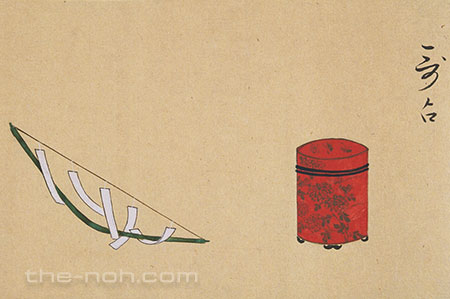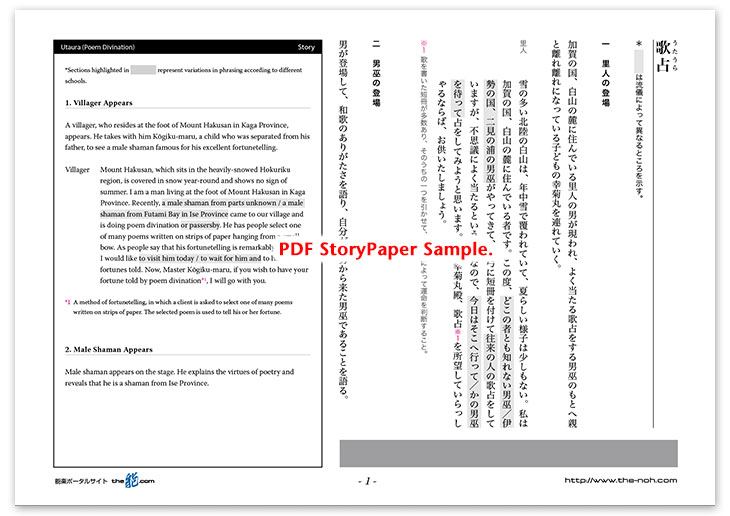
 Utaura (Poem Divination)
Utaura (Poem Divination)

![]()
Watarai Ietsugu is a young male shaman with white hair, originally from Futami Bay in Ise Province. He travels around the provinces telling people’s fortunes by the contents of a poem they select among many that are written on strips of paper and hung from a small bow. When he comes to the foot of Mount Hakusan in Kaga Province, a villager takes a child named Kōgiku-maru, who is looking for his father, to the male shaman as he heard that the shaman is good at fortunetelling. First the male shaman tells the fortune of the villager, predicting that the villager’s father will recover from an illness. Then, when he tells the fortune of Kōgiku-maru, he says that the boy has already met the father for whom he has been searching. Confused by the strange message of his divination, the male shaman talks with Kōgiku-maru and finds that Kōgiku-maru is, indeed, his own son. They are delighted to be reunited.
In the past, while he was travelling around the provinces, the male shaman died suddenly, but three days later, he came back to life. This caused his hair to turn white. When he was dead, he witnessed many things that happen in the hells, which he shows to the villagers through his singing and dancing. When he dances, the male shaman looks as though he has been possessed. His appearance is extremely eerie; he does not seem to belong to this world. Eventually he comes to his senses. He returns to his home in Ise, on good terms with his son.
![]()
The main storyline of this play is the reunion of father and son at the foot of a sacred mountain, Mount Hakusan. The father, Watarai Ietsugu, is a fortuneteller who travels around the provinces using poems to tell people their fortunes. Such poem divination is derived from oracles, in which a shaman orally conveyed the message of a deity in the form of a Japanese waka poem. Later on, it developed into a type of divination in which a person selects one of many written waka poems, which was then used to tell his or her fortune. This practice gradually took the form of the written o-mikuji fortune. This is why today, at a Japanese Shinto shrine, you can purchase o-mikuji with a Japanese waka poem or Chinese kanshi poem that tells your fortune.
There are other Noh pieces with the theme of father and son reuniting, such as Kagetsu, Tokusa, Hibariyama, and Yorobōshi. Especially distinct to Utaura, however, is the chanting and dance in the second half of the drama. The song describing scenes in the hells, which the man saw with his own eyes, uses difficult phrases that are hard to understand if the audience simply hears them. However, the dance of the eerie looking, white-haired male shaman creates a spine-chilling atmosphere on the stage. This dance probably incorporated the “Dance of the Hells” that was popular at the time this play was written. A Noh play called Hyakuman also includes the Dance of the Hells.
STORY PAPER : Utaura (Poem Divination)
Story Paper presents noh chant stories in modern speech, with story outlines, highlights and more using Adobe PDF format, which can print out and zoom in. Print out the pages and take them with you when you see the actual noh performance.

The copyright of Story Paper is held by the Noh.com. Story Paper is for individual use only. It is prohibited by the copyright law to distribute or publish printed-out Story Paper pages without prior consent. For more information, check the credit and disclaimer pages.



 [Utaura (Poem Divination) : Story Paper PDF : 614KB
[Utaura (Poem Divination) : Story Paper PDF : 614KB